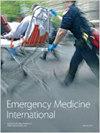中等收入国家氧气生态系统战略:黎巴嫩的回顾与案例研究
IF 0.8
4区 医学
Q3 EMERGENCY MEDICINE
引用次数: 0
摘要
COVID-19 大流行导致危重病人激增,全球对氧气治疗的需求骤增。氧气系统先前存在的缺口变得显而易见,各国政府、多边机构和其他合作伙伴争相增加氧气的生产、供应和使用,以满足这一需求。建立一个适合当地情况的氧气生态系统的重要性显而易见。在作者代表黎巴嫩政府和联合国儿童基金会对该国的氧气生态系统进行广泛评估后,本综述介绍了中等收入国家氧气生态系统的战略,以及黎巴嫩的具体经验。在评估过程中,作者走访了 15 家政府医院,并使用联合国儿童基金会氧气系统规划工具进行了评估,与主要利益相关者进行了讨论,并查阅了相关文件。最佳的氧气生态系统需要考虑到氧气的生产和向医疗机构的输送、医疗机构内的维护系统以及氧气的临床使用。黎巴嫩是中东地区的一个中低收入国家,正在应对一场影响卫生系统的广泛经济危机。关于加强黎巴嫩氧气生态系统的 18 项建议对其他中等收入国家也有借鉴意义,其中包括建立国家氧气委员会,安装更多氧气设备,加强维护和电力供应系统,提高生产、采购和供应链的适应能力,改善培训和人力资源,利用数据收集和定期信息指导生态系统,以及将氧气纳入卫生系统的其他部分。本文章由计算机程序翻译,如有差异,请以英文原文为准。
Strategies for Oxygen Ecosystems in Middle-Income Countries: A Review and Case Study from Lebanon
The COVID-19 pandemic led to a surge of critically ill patients and a sudden increase in the need for oxygen treatment worldwide. Pre-existing gaps in oxygen systems became apparent, and governments, multilateral agencies, and other partners scrambled to increase the production, supply, and use of oxygen to meet this need. The importance of an oxygen ecosystem that is appropriate for the local context became clear. This review describes strategies for oxygen ecosystems in middle-income countries, with specific experiences from Lebanon, following the authors’ extensive assessment of the country’s oxygen ecosystem, on behalf of the government and UNICEF. In the assessment, fifteen governmental hospitals were visited and evaluated using the UNICEF Oxygen System Planning Tool, discussions were held with key stakeholders, and documents were reviewed. An optimal oxygen ecosystem needs to take into consideration the production of oxygen and delivery to facilities, the maintenance system within facilities, and the clinical use of oxygen. Lebanon, a lower-middle income country in the Middle East, is contending with an extensive economic crisis affecting the health system. Eighteen recommendations for strengthening the oxygen ecosystem in Lebanon that are relevant for other middle-income countries include the establishment of a National Oxygen Committee, installation of additional oxygen plants, strengthened systems for maintenance and electricity supply, increased production, procurement and supply chain resilience, improved training and human resources, the use of data collection and regular information to guide the ecosystem, and integration of oxygen into the rest of the health system.
求助全文
通过发布文献求助,成功后即可免费获取论文全文。
去求助
来源期刊

Emergency Medicine International
EMERGENCY MEDICINE-
CiteScore
0.10
自引率
0.00%
发文量
187
审稿时长
17 weeks
期刊介绍:
Emergency Medicine International is a peer-reviewed, Open Access journal that provides a forum for doctors, nurses, paramedics and ambulance staff. The journal publishes original research articles, review articles, and clinical studies related to prehospital care, disaster preparedness and response, acute medical and paediatric emergencies, critical care, sports medicine, wound care, and toxicology.
 求助内容:
求助内容: 应助结果提醒方式:
应助结果提醒方式:


